Stephen Clary's Blog
October 28, 2019
Colorada
Coloradans cringe when they hear it. A passing conversation in an airport terminal; a couple discussing plans in a restaurant; the tourists chattering about the great adventures they’ve had. The southern accent. And then comes the infamous corruption of their beloved state’s name: Colorada.
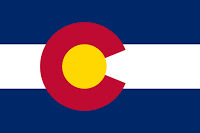 They grit their teeth and ignore it, but what they really want to do is get in the offender’s face and shout “Col-uh-rad-OHHHHH!” Of course the southerner doesn’t realize he’s offended anyone. Most of the states down south end with an “A”, so putting an A on the end of a state’s name is as natural as putting a dab of butter on grits.
They grit their teeth and ignore it, but what they really want to do is get in the offender’s face and shout “Col-uh-rad-OHHHHH!” Of course the southerner doesn’t realize he’s offended anyone. Most of the states down south end with an “A”, so putting an A on the end of a state’s name is as natural as putting a dab of butter on grits.
 Still, it would be nice if it were possible to get the message across that the mispronunciation is not appreciated. Perhaps Coloradans should engage in a little tit-for-tat. “You put an ‘A’ at the end of my state,” they might say, “and I’ll put an ‘O’ on the end of your state.” Alabamo. Florido. North and South Carolino. Virginio. Louisiano. Georgio. Oklahomo. That’s right—Okla-homo. Yeah, y’all hear that? Don’t like it much when the tables are turned, do you? But, you may ask, what about those southern states that don’t end with an ‘A’. Certainly those Texans are among the worst Colorada offenders. How do the Coloradans get back at them? Easy. Same solution. Add an ‘O’. Texaso. To fully appreciate this you may need to say it out loud. Tex-as-o Oh don’t get all riled up about this. I’m just having fun. I consider myself an impartial observer, having lived in Colorada, Oklahomo, Virginio and Mississippo. And, for several years, I was a Texasoian and I must admit it is a great state.
Still, it would be nice if it were possible to get the message across that the mispronunciation is not appreciated. Perhaps Coloradans should engage in a little tit-for-tat. “You put an ‘A’ at the end of my state,” they might say, “and I’ll put an ‘O’ on the end of your state.” Alabamo. Florido. North and South Carolino. Virginio. Louisiano. Georgio. Oklahomo. That’s right—Okla-homo. Yeah, y’all hear that? Don’t like it much when the tables are turned, do you? But, you may ask, what about those southern states that don’t end with an ‘A’. Certainly those Texans are among the worst Colorada offenders. How do the Coloradans get back at them? Easy. Same solution. Add an ‘O’. Texaso. To fully appreciate this you may need to say it out loud. Tex-as-o Oh don’t get all riled up about this. I’m just having fun. I consider myself an impartial observer, having lived in Colorada, Oklahomo, Virginio and Mississippo. And, for several years, I was a Texasoian and I must admit it is a great state.
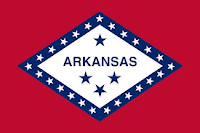 In conclusion, and in the interest of making sure no one feels left out, let me say a few more things: Kentucko. Tennesseo. Orkansas. (Bet you didn’t see that coming.)
In conclusion, and in the interest of making sure no one feels left out, let me say a few more things: Kentucko. Tennesseo. Orkansas. (Bet you didn’t see that coming.)
Published on October 28, 2019 18:17
November 23, 2014
Magic and Gravity
Spear Bearer Flash Fiction The big motorcycle, all black leather and chrome, leaned on its kickstand near the hitch of Gordon’s trailer. The magician sat on a short plastic stool and wiped a cloth over the fuel tank. Beads of sweat glistened on his shiny black scalp. “Hallo,” he said without turning when Manuel approached.
Some kids had piano, violin or guitar lessons after school. Manuel had magic lessons.
“What is magic?” Manuel asked. He had been coming to lessons for a week and he knew what magic wasn’t: card tricks, mirrors and boxes with false bottoms. That’s how illusionists worked. But Gordon taught magic. Gordon made things move with his mind.
 “What’s that?” Gordon asked, turning his head and looking at Manuel sidelong with a sparkling golden eye. “Magic?”
“What’s that?” Gordon asked, turning his head and looking at Manuel sidelong with a sparkling golden eye. “Magic?”
“I mean,” Manuel said, running his fingers through his wavy black hair, “What makes the things move? Where does the force come from?”
Gordon smiled and turned on his stool to fully face Manuel. Manuel could tell he liked the question. “It comes from everywhere. It comes from inside of you.”
Manuel shook his head. “That’s not what I mean. I mean how does it work? Like, if I was studying science at school, what would they say?”
Gordon laughed. “They’d say it was a lot of bunk.”
Manuel frowned. He wanted to know.
Gordon stopped laughing, but an ember of mirth remained in his eyes. “It’s a force of nature. An invisible and powerful force of nature. Like the wind.”
Manuel sighed. “But I know what the wind is. The air is filled with millions and millions of molecules and when they hit my face I feel it. But what is magic?”
“You are a bright little nipper,” Gordon said, his bright white smile beaming with pride. “I guess these American schools aren’t as bad as they say. What year are you?”
“I’m in the fourth grade.”
Gordon rubbed his chin for a minute. “I suppose it might be better to compare magic to gravity. Gravity holds us and everything to the earth.” Gordon pointed toward the sun that was about to dip below the horizon. “It also holds the earth in orbit about the sun, and the moon in orbit about the earth. It holds the sun in orbit around the center of the galaxy. It is invisible and works through the emptiness of space over fathomless distances. Magical, eh?”
“But scientists know what gravity is,” Manuel said.
Gordon shook his head. “No,” he said, “I suppose they have theories...”
“But what about Newton? He discovered gravity when he saw an apple fall from a tree.” Manuel saw a sudden grin form on Gordon’s face. He felt a little embarrassed because he didn’t know what was funny.
After a moment the magician answered. “Newton came up with the Law of Universal Gravitation that describes the behavior of gravity. He discovered equations that describe the effect of gravity, but he never figured out what causes the force behind gravity.”
Manuel looked at the trailer and again read the words that had been painted there when Gordon traveled with the carnival: The Amazing Gordon. “So...you’re saying magic is a force like gravity?”
“No.” Gordon shook his head. “I’m saying I don’t know what magic is any more than the physicists know what gravity is.”
“You’re saying the scientists don’t know what gravity is?” Manuel didn’t believe it.
“No,” Gordon said, slowly drawing out the ‘o’. “They talk about gravitons and string theory, and some other wonky ideas to boot, but it’s all just theory and thinking.”
Manuel had always had a vague idea that there must be a definite explanation for things like gravity and the only reason he didn’t know was because he was young and hadn’t learned them yet. Now he felt uneasy and wondered if Gordon might possibly be right. He looked at the ground and imagined himself just floating up and away into the sky helpless and out of control.
Gordon’s wrinkled face drew in with concern. “The universe is full of mysteries. There are many, many things you will never figure out.” The corners of Gordon’s lips turned up into a sympathetic smile. “But if you had everything figured out, wouldn’t the universe be a boring place?”
Manuel met Gordon’s eyes and wondered if that was it.
And Gordon returned the look.
And that was it. Manuel had asked what magic was and instead of getting an answer he only had more questions. He wasn’t sure he believed Gordon about gravity...he had only known him a week...and it wasn’t that he thought Gordon would lie...but after all Gordon wasn’t a physicist. But Manuel had an uncomfortable feeling that there were things he thought he understood he hadn’t really even thought about. And maybe, he thought, magic was more in everything than he’d ever imagined.
Some kids had piano, violin or guitar lessons after school. Manuel had magic lessons.
“What is magic?” Manuel asked. He had been coming to lessons for a week and he knew what magic wasn’t: card tricks, mirrors and boxes with false bottoms. That’s how illusionists worked. But Gordon taught magic. Gordon made things move with his mind.
 “What’s that?” Gordon asked, turning his head and looking at Manuel sidelong with a sparkling golden eye. “Magic?”
“What’s that?” Gordon asked, turning his head and looking at Manuel sidelong with a sparkling golden eye. “Magic?”“I mean,” Manuel said, running his fingers through his wavy black hair, “What makes the things move? Where does the force come from?”
Gordon smiled and turned on his stool to fully face Manuel. Manuel could tell he liked the question. “It comes from everywhere. It comes from inside of you.”
Manuel shook his head. “That’s not what I mean. I mean how does it work? Like, if I was studying science at school, what would they say?”
Gordon laughed. “They’d say it was a lot of bunk.”
Manuel frowned. He wanted to know.
Gordon stopped laughing, but an ember of mirth remained in his eyes. “It’s a force of nature. An invisible and powerful force of nature. Like the wind.”
Manuel sighed. “But I know what the wind is. The air is filled with millions and millions of molecules and when they hit my face I feel it. But what is magic?”
“You are a bright little nipper,” Gordon said, his bright white smile beaming with pride. “I guess these American schools aren’t as bad as they say. What year are you?”
“I’m in the fourth grade.”
Gordon rubbed his chin for a minute. “I suppose it might be better to compare magic to gravity. Gravity holds us and everything to the earth.” Gordon pointed toward the sun that was about to dip below the horizon. “It also holds the earth in orbit about the sun, and the moon in orbit about the earth. It holds the sun in orbit around the center of the galaxy. It is invisible and works through the emptiness of space over fathomless distances. Magical, eh?”
“But scientists know what gravity is,” Manuel said.
Gordon shook his head. “No,” he said, “I suppose they have theories...”
“But what about Newton? He discovered gravity when he saw an apple fall from a tree.” Manuel saw a sudden grin form on Gordon’s face. He felt a little embarrassed because he didn’t know what was funny.
After a moment the magician answered. “Newton came up with the Law of Universal Gravitation that describes the behavior of gravity. He discovered equations that describe the effect of gravity, but he never figured out what causes the force behind gravity.”
Manuel looked at the trailer and again read the words that had been painted there when Gordon traveled with the carnival: The Amazing Gordon. “So...you’re saying magic is a force like gravity?”
“No.” Gordon shook his head. “I’m saying I don’t know what magic is any more than the physicists know what gravity is.”
“You’re saying the scientists don’t know what gravity is?” Manuel didn’t believe it.
“No,” Gordon said, slowly drawing out the ‘o’. “They talk about gravitons and string theory, and some other wonky ideas to boot, but it’s all just theory and thinking.”
Manuel had always had a vague idea that there must be a definite explanation for things like gravity and the only reason he didn’t know was because he was young and hadn’t learned them yet. Now he felt uneasy and wondered if Gordon might possibly be right. He looked at the ground and imagined himself just floating up and away into the sky helpless and out of control.
Gordon’s wrinkled face drew in with concern. “The universe is full of mysteries. There are many, many things you will never figure out.” The corners of Gordon’s lips turned up into a sympathetic smile. “But if you had everything figured out, wouldn’t the universe be a boring place?”
Manuel met Gordon’s eyes and wondered if that was it.
And Gordon returned the look.
And that was it. Manuel had asked what magic was and instead of getting an answer he only had more questions. He wasn’t sure he believed Gordon about gravity...he had only known him a week...and it wasn’t that he thought Gordon would lie...but after all Gordon wasn’t a physicist. But Manuel had an uncomfortable feeling that there were things he thought he understood he hadn’t really even thought about. And maybe, he thought, magic was more in everything than he’d ever imagined.
Published on November 23, 2014 11:42
September 24, 2014
The Words We Choose
I like words. Tiny words and sesquipedalian words. Hoary words and nascent words. Repurposed words like ratchet (maybe a corruption of ‘wretched’...used pejoratively in the sentence ‘that girl is ratchet’); words that once were in but now aren’t so phat. Portmanteau words (á la Lewis Carol) like ginormous (which surprisingly dates back to 1948).
But when writing stories I think it is best to keep it simple. The idea is to communicate and every time your reader needs to search Dictionary.com he or she is taken out of the story. William Faulkner once said of Ernest Hemingway: “(Hemingway) has never been known to use a word that might send a reader to the dictionary.” And Hemingway replied: “Poor Faulkner. Does he really think big emotions come from big words? He thinks I don’t know the ten-dollar words. I know them all right. But there are older and simpler and better words, and those are the ones I use.”
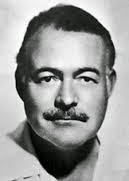 As Hemingway suggests, knowing the ‘ten-dollar words’ is something you would expect of a writer...after all, a writer reads a lot more than he or she writes, and a product of reading is a good vocabulary. But when it comes to word choice in your writing it’s not the time to be show off your vocabulary prowess.
As Hemingway suggests, knowing the ‘ten-dollar words’ is something you would expect of a writer...after all, a writer reads a lot more than he or she writes, and a product of reading is a good vocabulary. But when it comes to word choice in your writing it’s not the time to be show off your vocabulary prowess.
I personally don’t think that less common words should be avoided altogether. There will be times when a particular word is the perfect fit and worth making a reader go to the dictionary. Even Hemingway made me pick up the dictionary at least a time or two.
My biggest problem with those uncommon words is pronunciation. I’m a reader and when I look up words I am more interested in the definition than the phonetics. Unfortunately, I often make a fool of myself by mispronouncing a word.
I think it might help to make poems in which a rhyme of the word I need to learn to pronounce is used. For example:
He looked around as he pulled apart the brioche,
and wondered if to spread jelly would be gauche.
 I had to cheat and use rhymezone.com for that one (there isn’t a whole lot that rhymes with 'gauche' it turns out).
I had to cheat and use rhymezone.com for that one (there isn’t a whole lot that rhymes with 'gauche' it turns out).
Here is another:
Abandoned with these manacles on me--
My emotions flowed from
Anger to fear to desperation and finally ennui.
Feel free to share rhymes of your favorite uncommon words.
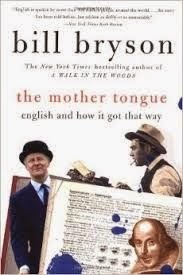 If you are interested a fun look at English words and the language in general, I recommend Bill Bryson’s The Mother Tongue (English and how it got that way). After you read that you might want to follow it up with Bryson’s Made in America: An Informal History of the English Language in the United States.
If you are interested a fun look at English words and the language in general, I recommend Bill Bryson’s The Mother Tongue (English and how it got that way). After you read that you might want to follow it up with Bryson’s Made in America: An Informal History of the English Language in the United States.
But when writing stories I think it is best to keep it simple. The idea is to communicate and every time your reader needs to search Dictionary.com he or she is taken out of the story. William Faulkner once said of Ernest Hemingway: “(Hemingway) has never been known to use a word that might send a reader to the dictionary.” And Hemingway replied: “Poor Faulkner. Does he really think big emotions come from big words? He thinks I don’t know the ten-dollar words. I know them all right. But there are older and simpler and better words, and those are the ones I use.”
 As Hemingway suggests, knowing the ‘ten-dollar words’ is something you would expect of a writer...after all, a writer reads a lot more than he or she writes, and a product of reading is a good vocabulary. But when it comes to word choice in your writing it’s not the time to be show off your vocabulary prowess.
As Hemingway suggests, knowing the ‘ten-dollar words’ is something you would expect of a writer...after all, a writer reads a lot more than he or she writes, and a product of reading is a good vocabulary. But when it comes to word choice in your writing it’s not the time to be show off your vocabulary prowess.I personally don’t think that less common words should be avoided altogether. There will be times when a particular word is the perfect fit and worth making a reader go to the dictionary. Even Hemingway made me pick up the dictionary at least a time or two.
My biggest problem with those uncommon words is pronunciation. I’m a reader and when I look up words I am more interested in the definition than the phonetics. Unfortunately, I often make a fool of myself by mispronouncing a word.
I think it might help to make poems in which a rhyme of the word I need to learn to pronounce is used. For example:
He looked around as he pulled apart the brioche,
and wondered if to spread jelly would be gauche.
 I had to cheat and use rhymezone.com for that one (there isn’t a whole lot that rhymes with 'gauche' it turns out).
I had to cheat and use rhymezone.com for that one (there isn’t a whole lot that rhymes with 'gauche' it turns out).Here is another:
Abandoned with these manacles on me--
My emotions flowed from
Anger to fear to desperation and finally ennui.
Feel free to share rhymes of your favorite uncommon words.
 If you are interested a fun look at English words and the language in general, I recommend Bill Bryson’s The Mother Tongue (English and how it got that way). After you read that you might want to follow it up with Bryson’s Made in America: An Informal History of the English Language in the United States.
If you are interested a fun look at English words and the language in general, I recommend Bill Bryson’s The Mother Tongue (English and how it got that way). After you read that you might want to follow it up with Bryson’s Made in America: An Informal History of the English Language in the United States.
Published on September 24, 2014 17:51
September 3, 2014
A Twitter Newbie’s first approximation for a code of conduct
I have been on Twitter many months now. I’ve read a lot of great articles, saw some great photos and art, and had a laugh or two. Along the way I’ve been working on my personal code of conduct.
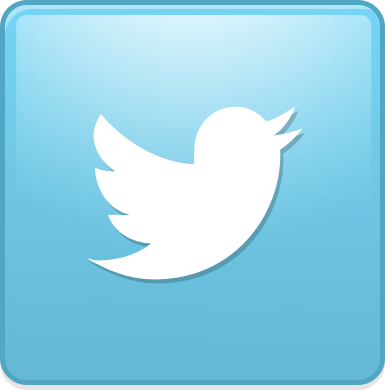 Rule Number 1: I won’t try to sell you.
Rule Number 1: I won’t try to sell you.
I won’t be asking you to buy any of my novels or short stories on Twitter. Ever. Promise.
For writers, musicians, and movie stars that have a large following, I’m sure they find Twitter is a great tool to keep in touch with their fans. But for the rest of us, I don’t think that Twitter works for direct marketing and I am almost positive that incessantly spamming your followers with BUY MY BOOK or whatever is going to produce much in the way of sales. It has the opposite effect on me.
Only rarely do I check the general feed because when I do I am overwhelmed with a torrent of tweets. To get the most out of Twitter I have made a select list of my favorites. Instead of wading through a flood of tweets I just go check out my favorites to see if they have anything interesting for me. No one on my favorites list spams their followers with BUY MY STUFF tweets. I bet there are a lot of folks like me.
I will tweet links to my blog. And maybe I will tweet links to Smashwords where you can get my novels and short stories for free.
I want you to read my blog, my novels and my short stories. I hope you enjoy them. I hope you’ll post comments. I hope you will leave positive reviews.
What I’m hoping to do is connect with people, not to sell them.
Rule Number 2: I won’t post just because I can.
I’m not going to tweet the mundane. I won’t give the weather forecast; I won’t tell you I’m getting out of bed; I won’t tell you I’m having Shredded Wheat for breakfast.
Most of my tweets will be retweets. There are a lot of interesting and creative people out there and I want to share their insightful, funny or beautiful thoughts.
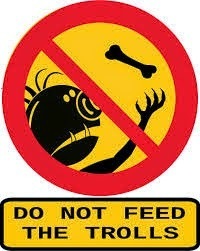 Rule Number 3: If you’re not a troll, I’ll follow you back
Rule Number 3: If you’re not a troll, I’ll follow you back
No, I’m not going to pay $5 for 20,000 followers. Who would do that anyway?
And what about those people that follow you and immediately unfollow you after you’ve followed them? I guess they think people will think they are a superstar with their 100 to 1 ratio? What I think is that they’re trolls. Tools like ManageFlitter will help you throw those trolls back under the bridge.
But if you are a real person then I’ll follow you back. I’ll look at your latest tweets. I’ll check out your blog if you have one. If you have content that I connect with, then I’ll add you to my favorites list.
 Observation: On Facebook I have friends; on Twitter I have followers.
Observation: On Facebook I have friends; on Twitter I have followers.
On Facebook I connect with people I know; on Twitter I connect with people that have common interests. On Facebook I share photos of me and my family; on Twitter I talk about books and writing mostly.
I hope this doesn’t rub you the wrong way if you have a Facebook fan page. I’m not saying that there is anything wrong with that. It’s
just not for me.
Please find me @StepClary on Twitter and tell me your Twitter Code of Conduct.
 Rule Number 1: I won’t try to sell you.
Rule Number 1: I won’t try to sell you.I won’t be asking you to buy any of my novels or short stories on Twitter. Ever. Promise.
For writers, musicians, and movie stars that have a large following, I’m sure they find Twitter is a great tool to keep in touch with their fans. But for the rest of us, I don’t think that Twitter works for direct marketing and I am almost positive that incessantly spamming your followers with BUY MY BOOK or whatever is going to produce much in the way of sales. It has the opposite effect on me.
Only rarely do I check the general feed because when I do I am overwhelmed with a torrent of tweets. To get the most out of Twitter I have made a select list of my favorites. Instead of wading through a flood of tweets I just go check out my favorites to see if they have anything interesting for me. No one on my favorites list spams their followers with BUY MY STUFF tweets. I bet there are a lot of folks like me.
I will tweet links to my blog. And maybe I will tweet links to Smashwords where you can get my novels and short stories for free.
I want you to read my blog, my novels and my short stories. I hope you enjoy them. I hope you’ll post comments. I hope you will leave positive reviews.
What I’m hoping to do is connect with people, not to sell them.
Rule Number 2: I won’t post just because I can.
I’m not going to tweet the mundane. I won’t give the weather forecast; I won’t tell you I’m getting out of bed; I won’t tell you I’m having Shredded Wheat for breakfast.
Most of my tweets will be retweets. There are a lot of interesting and creative people out there and I want to share their insightful, funny or beautiful thoughts.
 Rule Number 3: If you’re not a troll, I’ll follow you back
Rule Number 3: If you’re not a troll, I’ll follow you backNo, I’m not going to pay $5 for 20,000 followers. Who would do that anyway?
And what about those people that follow you and immediately unfollow you after you’ve followed them? I guess they think people will think they are a superstar with their 100 to 1 ratio? What I think is that they’re trolls. Tools like ManageFlitter will help you throw those trolls back under the bridge.
But if you are a real person then I’ll follow you back. I’ll look at your latest tweets. I’ll check out your blog if you have one. If you have content that I connect with, then I’ll add you to my favorites list.
 Observation: On Facebook I have friends; on Twitter I have followers.
Observation: On Facebook I have friends; on Twitter I have followers.On Facebook I connect with people I know; on Twitter I connect with people that have common interests. On Facebook I share photos of me and my family; on Twitter I talk about books and writing mostly.
I hope this doesn’t rub you the wrong way if you have a Facebook fan page. I’m not saying that there is anything wrong with that. It’s
just not for me.
Please find me @StepClary on Twitter and tell me your Twitter Code of Conduct.
Published on September 03, 2014 19:20
August 9, 2014
My Appeal to Writers for Lower Audio Book Pricing
So...Amazon and Hachette Publishing have been having a big battle. The cynical side of me thinks that this is essentially two big companies fighting over a bigger piece of the publishing pie. Amazon want's a bigger piece of the pie so they want e-books to be priced low so more people will buy them and read them on the Kindle. Hachette wants the price high so they can sell their paper books where they get a bigger slice.
Below I've included a link to the letter for you to read if you like. It's Amazon's appeal to writers to side with them in their desire for lower ebook prices. Maybe you'll feel inspired and join the email campaign against Hachette's e-book pricing policy. I found it interesting reading. My favorite paragraph was: "...e-books are highly price elastic. This means that when the price goes down, customers buy much more. We've quantified the price elasticity of e-books from repeated measurements across many titles. For every copy an e-book would sell at $14.99, it would sell 1.74 copies if priced at $9.99. So, for example, if customers would buy 100,000 copies of a particular e-book at $14.99, then customers would buy 174,000 copies of that same e-book at $9.99. Total revenue at $14.99 would be $1,499,000. Total revenue at $9.99 is $1,738,000. The important thing to note here is that the lower price is good for all parties involved: the customer is paying 33% less and the author is getting a royalty check 16% larger and being read by an audience that’s 74% larger. The pie is simply bigger."
Yeah, I mostly side with Amazon in this argument. But I think Hachette inevitably is just hurting itself, so in the end I see this as a problem that will eventually resolve itself. If I were an author under contract with Hachette I'd be writing a letter telling them that I think they are being greedy and narrow-minded. But I'm not, so I don't really care too much. I might be hurt as a reader if I want to read one of Hatchette's books, but then I'll just go find something less expensive to read. I have lots of good books to choose from.
But here is something I don't hear discussed: lower audio book pricing. I'm an Audible subscriber and so I get books at a reduced price; but if it weren't for Audible the only audio books I'd listen to would be what I could check out from the library. And why are the audio books so expensive? Sure, an actor must be paid to read the book. There is usually a producer, a sound studio, technicians, and editors. Expensive, right? Maybe, but it is a non-recurring expense, and is it really much more expensive than what is paid to editors and artists and printers for a paper book? Anyway, arguing that the extra expense of producing the audio book makes it more expensive falls apart when you compare audio book prices to movie prices.
Take Divergent by Veronica Roth, for example. On Amazon the Divergent audio book price (CD) is $12.33 and the movie price (DVD) is $15.96. The movie budget was $85 million. I have no idea what the audio book budget was, but I think it's safe to guess that it is a statistically insignificant fraction of $85 million. And for the newest book in the series, Allegiant, the audio book price is $20.59--well above what will be charged for the movie version when it is new.
So that's my thoughts on audio book pricing. Let me know what you think.
Here is that link to Amazon's letter I promised. A Message from the Amazon Books Team. Enjoy.
Below I've included a link to the letter for you to read if you like. It's Amazon's appeal to writers to side with them in their desire for lower ebook prices. Maybe you'll feel inspired and join the email campaign against Hachette's e-book pricing policy. I found it interesting reading. My favorite paragraph was: "...e-books are highly price elastic. This means that when the price goes down, customers buy much more. We've quantified the price elasticity of e-books from repeated measurements across many titles. For every copy an e-book would sell at $14.99, it would sell 1.74 copies if priced at $9.99. So, for example, if customers would buy 100,000 copies of a particular e-book at $14.99, then customers would buy 174,000 copies of that same e-book at $9.99. Total revenue at $14.99 would be $1,499,000. Total revenue at $9.99 is $1,738,000. The important thing to note here is that the lower price is good for all parties involved: the customer is paying 33% less and the author is getting a royalty check 16% larger and being read by an audience that’s 74% larger. The pie is simply bigger."
Yeah, I mostly side with Amazon in this argument. But I think Hachette inevitably is just hurting itself, so in the end I see this as a problem that will eventually resolve itself. If I were an author under contract with Hachette I'd be writing a letter telling them that I think they are being greedy and narrow-minded. But I'm not, so I don't really care too much. I might be hurt as a reader if I want to read one of Hatchette's books, but then I'll just go find something less expensive to read. I have lots of good books to choose from.
But here is something I don't hear discussed: lower audio book pricing. I'm an Audible subscriber and so I get books at a reduced price; but if it weren't for Audible the only audio books I'd listen to would be what I could check out from the library. And why are the audio books so expensive? Sure, an actor must be paid to read the book. There is usually a producer, a sound studio, technicians, and editors. Expensive, right? Maybe, but it is a non-recurring expense, and is it really much more expensive than what is paid to editors and artists and printers for a paper book? Anyway, arguing that the extra expense of producing the audio book makes it more expensive falls apart when you compare audio book prices to movie prices.
Take Divergent by Veronica Roth, for example. On Amazon the Divergent audio book price (CD) is $12.33 and the movie price (DVD) is $15.96. The movie budget was $85 million. I have no idea what the audio book budget was, but I think it's safe to guess that it is a statistically insignificant fraction of $85 million. And for the newest book in the series, Allegiant, the audio book price is $20.59--well above what will be charged for the movie version when it is new.
So that's my thoughts on audio book pricing. Let me know what you think.
Here is that link to Amazon's letter I promised. A Message from the Amazon Books Team. Enjoy.
Published on August 09, 2014 13:05
July 12, 2014
How to Stop Your Self-help Book Addiction in 12 Easy Steps
Here is an outline on my forthcoming book: How to Stop Your Self-Help Book Addiction in 12 Easy Steps
Chapter 1: Get off your lazy butt
You’re not going to take that next step toward self-actualization sitting on the couch eating Twinkies and watching Dr. Phil. Or reading this book for that matter.
Chapter 2: It’s your own fault
The economy sucks? The man wants to keep you down? You can’t express your true worth on a resume? But if that’s your excuse for sitting in your parent’s basement playing Halo with your e-buddies, maybe the person to blame is closer than you think. Maybe you should go out and get a job.
Chapter 3: Common Sense—Use your own for a change The 7 Habits of Highly Effective People by Steven Covey
1. Be Proactive 2. Begin with the end in mind 3. Put first things first 4. Think win-win 5. Seek first to understand, and then to be understood 6. (Random buzz word) 7. One more habit because The 6 Habits of Highly Effective People doesn’t sound as good
When you read that you think “yeah” and “yeah” and “wow that makes so much sense!” You know why? Because it’s what most people call common sense. Try it sometime. But maybe you should try this in baby-steps, because let’s face it, you are reading a self-help book on how to stop buying self-help books. That’s like buying a pack of cigarettes to help you stop smoking. (Okay, that might work if the cigarettes explode.)
Chapter 4: Don’t take yourself so seriously.
Believe me, I can’t take you seriously. Not after you bought this stupid book.
Chapter 5: Why don’t you try working?
So you still haven’t won the lottery? Maybe you need to look at your financial plan again. And writing a 2000 word “novel” and putting it on sale at Smashwords for $21.99 isn’t a plan. Success takes hard work. If you don’t want to work hard, learn to accept mediocrity.
Chapter 6: Okay, I don’t have 12 steps:
So sue me. There are a lot of people out there willing to say anything to get a buck off you. I’m one of them.
If you have more chapter topics let me know. I’d love to steal...I mean...hear them.
 I do hope people realize when I'm kidding...
Chapter 1: Get off your lazy butt
You’re not going to take that next step toward self-actualization sitting on the couch eating Twinkies and watching Dr. Phil. Or reading this book for that matter.
Chapter 2: It’s your own fault
The economy sucks? The man wants to keep you down? You can’t express your true worth on a resume? But if that’s your excuse for sitting in your parent’s basement playing Halo with your e-buddies, maybe the person to blame is closer than you think. Maybe you should go out and get a job.
Chapter 3: Common Sense—Use your own for a change The 7 Habits of Highly Effective People by Steven Covey
1. Be Proactive 2. Begin with the end in mind 3. Put first things first 4. Think win-win 5. Seek first to understand, and then to be understood 6. (Random buzz word) 7. One more habit because The 6 Habits of Highly Effective People doesn’t sound as good
When you read that you think “yeah” and “yeah” and “wow that makes so much sense!” You know why? Because it’s what most people call common sense. Try it sometime. But maybe you should try this in baby-steps, because let’s face it, you are reading a self-help book on how to stop buying self-help books. That’s like buying a pack of cigarettes to help you stop smoking. (Okay, that might work if the cigarettes explode.)
Chapter 4: Don’t take yourself so seriously.
Believe me, I can’t take you seriously. Not after you bought this stupid book.
Chapter 5: Why don’t you try working?
So you still haven’t won the lottery? Maybe you need to look at your financial plan again. And writing a 2000 word “novel” and putting it on sale at Smashwords for $21.99 isn’t a plan. Success takes hard work. If you don’t want to work hard, learn to accept mediocrity.
Chapter 6: Okay, I don’t have 12 steps:
So sue me. There are a lot of people out there willing to say anything to get a buck off you. I’m one of them.
If you have more chapter topics let me know. I’d love to steal...I mean...hear them.
 I do hope people realize when I'm kidding...
Published on July 12, 2014 05:58
June 29, 2014
Writing Advice
Step 1) Read Strunk & White's Elements of Style.
Step 2) Read Brown and King’s Self-Editing for Fiction Writers: How to Edit Yourself Into Print. Repeat.
Step 3) Write a short story or novel and take it to the critique boards. Get your feelings hurt when people point out all the problems. Cry a little. Try again. Get your feelings hurt again. Try again. And again. And there will still be problems, but maybe not as many, and your skin has gotten thicker. So now you've learned how to take criticism. A lot of people live their entire lives without learning this skill--be proud.
Step 4) Repeat Steps 1 and 2.
Step 5) Keep writing. Keep editing. Develop a style; find your voice. Write more. Edit more. Send your novels to literary agents and publishers. Get form rejection letters. Realize you're not so special. Keep writing. Keep editing. Remember, this is what you like. Don't give up, because you've already succeeded. You are doing what you like.
Step 2) Read Brown and King’s Self-Editing for Fiction Writers: How to Edit Yourself Into Print. Repeat.
Step 3) Write a short story or novel and take it to the critique boards. Get your feelings hurt when people point out all the problems. Cry a little. Try again. Get your feelings hurt again. Try again. And again. And there will still be problems, but maybe not as many, and your skin has gotten thicker. So now you've learned how to take criticism. A lot of people live their entire lives without learning this skill--be proud.
Step 4) Repeat Steps 1 and 2.
Step 5) Keep writing. Keep editing. Develop a style; find your voice. Write more. Edit more. Send your novels to literary agents and publishers. Get form rejection letters. Realize you're not so special. Keep writing. Keep editing. Remember, this is what you like. Don't give up, because you've already succeeded. You are doing what you like.
Published on June 29, 2014 19:49
June 5, 2014
The Story behind The Globe
Katelynn and Rosie, the sisters in The Globe, are loosely based on my daughters Katie and Abby. I didn’t make it a secret. Maybe I should have.
At one point while I read the story to them, Katie burst into tears. “You don’t think I’m that mean, do you?”Oops. And I thought I’d toned the fighting down a bit.
 Yes, my daughters used to fight often. Screaming. Yelling. Pushing. And the inevitable crying. When I got involved I only made things worse.
Yes, my daughters used to fight often. Screaming. Yelling. Pushing. And the inevitable crying. When I got involved I only made things worse.
I think I began writing The Globe as a sort of self-therapy. I had heard the word ‘hate’ used by each of my daughters and it broke my heart. So I wrote this tale of adventure where two sisters, who often don’t get along, are thrust into deadly situations. I wanted to see, as a father, the deep love that I know my daughters have for one another. By putting these characters, who are so very like my own daughters, through the trial, I was able to see this love in action, if only in fiction.
After Katie had her meltdown from the story I tried to comfort her. “Katelynn isn’t you...she’s had a hard life. Her dad left and never came back. She’s upset.” And I added, “Katelynn is the main hero of the story. You’ll see.”
So I was able to finish reading The Globe to Katie and Abby. There is no grand revelation in the story; Katelynn and Rosie don’t miraculously understand each other and resolve never to argue again. Instead, the reader will see that the girls both hate and love each other. And in real life my daughters didn’t behave any better toward each other after hearing the story than before.
But I felt better. My self-therapy worked.
The Globe is now an Amazon Breakthrough Novel Quarter Finalist. The full novel can also be found on Amazon here.
#ABNA #YA
At one point while I read the story to them, Katie burst into tears. “You don’t think I’m that mean, do you?”Oops. And I thought I’d toned the fighting down a bit.
 Yes, my daughters used to fight often. Screaming. Yelling. Pushing. And the inevitable crying. When I got involved I only made things worse.
Yes, my daughters used to fight often. Screaming. Yelling. Pushing. And the inevitable crying. When I got involved I only made things worse.I think I began writing The Globe as a sort of self-therapy. I had heard the word ‘hate’ used by each of my daughters and it broke my heart. So I wrote this tale of adventure where two sisters, who often don’t get along, are thrust into deadly situations. I wanted to see, as a father, the deep love that I know my daughters have for one another. By putting these characters, who are so very like my own daughters, through the trial, I was able to see this love in action, if only in fiction.
After Katie had her meltdown from the story I tried to comfort her. “Katelynn isn’t you...she’s had a hard life. Her dad left and never came back. She’s upset.” And I added, “Katelynn is the main hero of the story. You’ll see.”
So I was able to finish reading The Globe to Katie and Abby. There is no grand revelation in the story; Katelynn and Rosie don’t miraculously understand each other and resolve never to argue again. Instead, the reader will see that the girls both hate and love each other. And in real life my daughters didn’t behave any better toward each other after hearing the story than before.
But I felt better. My self-therapy worked.
The Globe is now an Amazon Breakthrough Novel Quarter Finalist. The full novel can also be found on Amazon here.
#ABNA #YA
Published on June 05, 2014 17:57
May 23, 2014
ABNA--My Second Place Prize
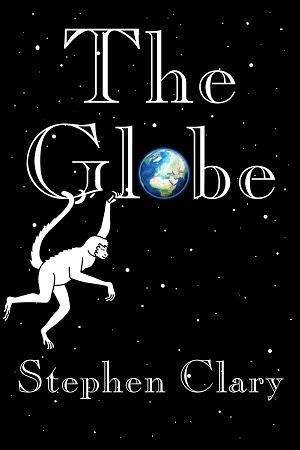 I received my Publisher's Weekly review for my novel The Globe today. While not all the Quarter-Finalist's reviews were positive, I am very happy with mine. There are a few critical words at the end, but I don't think you can take a review seriously if it sounds like it is written by your biggest fan.
I received my Publisher's Weekly review for my novel The Globe today. While not all the Quarter-Finalist's reviews were positive, I am very happy with mine. There are a few critical words at the end, but I don't think you can take a review seriously if it sounds like it is written by your biggest fan.If you have a few minutes, please read the excerpt for the Globe (it's a quick, fun read!) and leave feedback. It might help me move on to the next round. Thanks.
Below is the complete review.ABNA Publishers Weekly Reviewer
 A quick, fun read, this novel is written in a unique and appealing voice. Katelynn and Rosie Pursiful are sisters, and like many siblings, they fight often. Katelynn, the older sister, always thinks she knows what’s best and never listens to Rosie. Rosie, meanwhile, just won’t go along with Katelynn even when it makes no sense not to. They live alone with their mother in a small apartment they recently moved to from the big house they all lived in with their father, George Pursiful, before he went missing. When an unexplained globe turns up at their house one day bearing George’s business card and a strange riddle, the girls are plunged headlong into a strange game that begins to explain the mystery of how their father disappeared. Aided by the spinning globe, the girls can be transported instantly to different parts of the world. Soon, the girls are forced to reckon with challenges as fearsome as a tar golem, the Minotaur in its maze, and invisible scorpions in order to defeat a man who holds them hostage in his game. They slowly realize that working together is the only way they can find their way home. While the novel may lack in suspense and depth of character, the worlds the girls visit are richly rendered and their grudging affection for one another endearingly sincere.
A quick, fun read, this novel is written in a unique and appealing voice. Katelynn and Rosie Pursiful are sisters, and like many siblings, they fight often. Katelynn, the older sister, always thinks she knows what’s best and never listens to Rosie. Rosie, meanwhile, just won’t go along with Katelynn even when it makes no sense not to. They live alone with their mother in a small apartment they recently moved to from the big house they all lived in with their father, George Pursiful, before he went missing. When an unexplained globe turns up at their house one day bearing George’s business card and a strange riddle, the girls are plunged headlong into a strange game that begins to explain the mystery of how their father disappeared. Aided by the spinning globe, the girls can be transported instantly to different parts of the world. Soon, the girls are forced to reckon with challenges as fearsome as a tar golem, the Minotaur in its maze, and invisible scorpions in order to defeat a man who holds them hostage in his game. They slowly realize that working together is the only way they can find their way home. While the novel may lack in suspense and depth of character, the worlds the girls visit are richly rendered and their grudging affection for one another endearingly sincere.
Published on May 23, 2014 16:19
May 12, 2014
ABNA--The Real Prize is the Second Prize
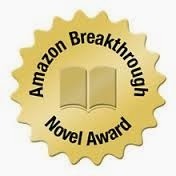 In an earlier post--ABNA It's all over except for the crying--I suggest that the Amazon Breakthrough Novel Award contest isn't so much an award as job application. Now that I've been involved with the competition for a while, I've modified my thinking on that. I still think that the Grand Prize and First Place winners are actually just candidates that have been awarded a contract, not terribly different from any other author signing with any other publisher. The Grand Prize of $50,000 and the four First Place prizes of $15,000 are actually advances on future sales. Altogether the prizes add up to $110,000, and Amazon will recapture some if not all of that money in book sales. In many cases, I hope, Amazon will earn profits from the novels that win.
In an earlier post--ABNA It's all over except for the crying--I suggest that the Amazon Breakthrough Novel Award contest isn't so much an award as job application. Now that I've been involved with the competition for a while, I've modified my thinking on that. I still think that the Grand Prize and First Place winners are actually just candidates that have been awarded a contract, not terribly different from any other author signing with any other publisher. The Grand Prize of $50,000 and the four First Place prizes of $15,000 are actually advances on future sales. Altogether the prizes add up to $110,000, and Amazon will recapture some if not all of that money in book sales. In many cases, I hope, Amazon will earn profits from the novels that win.

So maybe the Grand Prize and First Place winners haven't exactly won a prize (though that is arguable since the advances are very generous for unproven authors), but for the 500 Quarter-Finalists there is a no-strings attached 'Second Prize': a professional book review by Publishers Weekly. A self-published author would have to pay $125 just to get a 25% chance at a professional editorial review by PW. Similarly, Kirkus charges $425 for a professional review. In the official rules Amazon says that the 'Second Prize' PW review has no cash value, and it is impossible to guess how much Amazon is paying for the reviews since they are sure to have cut a special deal. But I don't think it is too bold to say that each review is worth at least $400 to the author, so I estimate the value of the combined Second Place awards to be $200,000 (500 entries times $400). That's almost twice the Grand and First Place winner's advances combined.
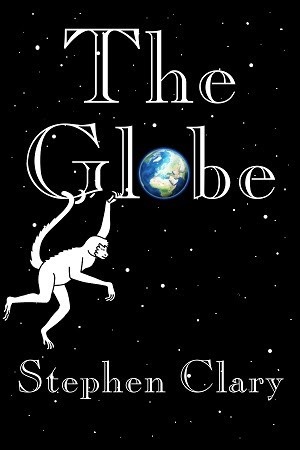 So...thanks Amazon. I humbly accept the 'real' ABNA prize: the professional book review by Publishers Weekly for my entry The Globe. And on behalf of thousands of novelists looking to find an audience, a big thank you to Amazon, Publishers Weekly, and the Amazon Viners for the ABNA competition--it is so much more than a chance at a book publishing contract.
So...thanks Amazon. I humbly accept the 'real' ABNA prize: the professional book review by Publishers Weekly for my entry The Globe. And on behalf of thousands of novelists looking to find an audience, a big thank you to Amazon, Publishers Weekly, and the Amazon Viners for the ABNA competition--it is so much more than a chance at a book publishing contract. #ABNA #ABNA2014
Published on May 12, 2014 18:47



